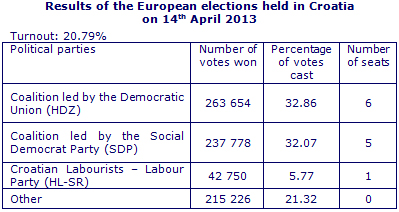Results
News
Corinne Deloy,
Helen Levy
-

Available versions :
EN

Corinne Deloy
Helen Levy
The coalition headed by the Democratic Union (HDZ), the main opposition party led by Tomislav Karamarko, came top in the first European elections organised in Croatia on 14th April 2013. It collected 32.86% of the vote and won 6 of the 12 seats. The coalition led by Prime Minister Zoran Milanovic's Social Democrat Party (SDP) won 32.07% of the vote, gaining 5 seats. The last seat went to the Croatian Labourists - Labour Party (HL-SR), the opposition party led by Dragutin Lesar, which collected 5.77% of the vote.
In July the 12 new Croatian MEPs will replace the observers who were appointed by members of the Hrvatski Sabor, the Croatian Parliament's single chamber, and who have been sitting in the European Parliament since March 2011. They will sit for only one year since European elections will be held in all countries in the Union between 22nd and 25th May 2014. Only a small number of these observers were candidates in the European elections.
The opposition's victory in the first European vote was a surprise since HDZ has suffered a great deal from the various corruption cases in which several of its members have been involved. The opposition benefited from the social democrats' difficulties in facing up to the country's economic difficulties and from the low turnout, particularly amongst the electorate of the party in power.
 Source: website of the Croatian electoral commission (http://www.izbori.hr/2013EUParlament/rezult/r_00_0000_000.html?t=1365972717300 )
Source: website of the Croatian electoral commission (http://www.izbori.hr/2013EUParlament/rezult/r_00_0000_000.html?t=1365972717300 )
Turnout was indeed extremely low. At 20.79% it was well below the 43.54% recorded during the referendum on Croatian membership of the European Union on 22nd January 2012. According to political analyst Zarko Puhovski, the Croatians have probably not yet taken the measure of the importance of the elections.
The candidates were not very well known and the electoral campaign was almost invisible: no party convention, no televised debate. "Go out and vote. We have the possibility of electing our representatives for the first time. They will not be representing the government or the parliamentary majority; they will be representing the Croatian people. That's why it's essential that you go and vote so that those who will represent us in Europe see the seriousness and maturity of the Croatians" declared Foreign and European Minister, Vesna Pusic (HNS). She was elected on 23rd March as president of the party, replacing Radimir Cacic who had to resign after being sentenced to 2 years in prison in Hungary for his involvement in 2010 in a car accident that caused the death of 2 people.
President of the Republic Ivo Josipovic decided not to organise the European elections on the same day as the local elections, planned for 19th May. The two elections - European and town council - do not use the same voting method. The European elections were organised within a single national circumscription with open lists on which voters could rank candidates according to their preference. A list had to collect at least 5% of the votes cast to take part in the distribution of seats.
Finally, "Croatian support for EU membership has been whittled away over the past few years due to the country's difficult economic situation and distrust of the local political class, as well as due to the economic problems with which the European Union itself is confronted," declared Radovan Vukadinovic, professor of international relations at Zagreb University. The people's enthusiasm for the European Union, which culminated in 2003 with 80% of positive opinions, has indeed fallen sharply. Nevertheless the Croatian people, who suffered enormously during the war with the Serbs, still see membership of the European Union as a guarantee of peace and stability.
Zagreb is enduring a serious economic crisis and has been in recession since 2008. Last year GDP fell by 2% in one year. However, growth could reach 0.7% in 2013.
GDP per Croatian represents only 60% of the European average. The average monthly salary is 5 529 kuna (€726) and the unemployment rate in February was over 21.9% of the active population (40% amongst young people aged under 24), according to the National Statistics Institute (DZS). The country should benefit from financial aid of around €13 billion from the European Union between now and 2020.
On 1st July 2013 Croatia will therefore become, after Slovenia, the second former Yugoslavian Republic to join the European Union. On 2nd April last Ljubljana unanimously ratified the treaty of Croatia's membership of the European Union.
On the same theme
To go further
Elections in Europe
Corinne Deloy
—
17 December 2024
Elections in Europe
9 December 2024
Elections in Europe
Corinne Deloy
—
3 December 2024
Elections in Europe
Corinne Deloy
—
3 December 2024

The Letter
Schuman
European news of the week
Unique in its genre, with its 200,000 subscribers and its editions in 6 languages (French, English, German, Spanish, Polish and Ukrainian), it has brought to you, for 15 years, a summary of European news, more needed now than ever
Versions :




